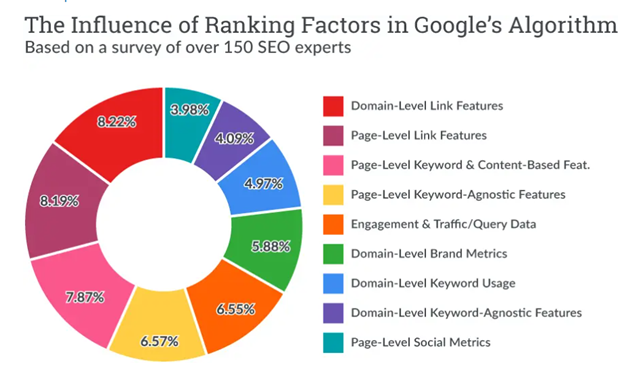Search engine optimization, or SEO is the process of enhancing your website’s content to make it rank higher on search engine results pages for specific keywords and phrases. This can help your website attract more organic traffic when people search for those terms, which can be beneficial for your business. This can increase your website’s traffic and visibility for your brand. Here are some basic SEO principles and how they can help businesses. So Let’s dive into .
What is SEO?
SEO stands for Search engine optimization and is a set of techniques that help web pages rank higher in organic search results. Since organic search is the most common way people find information online, having a solid SEO plan is critical for boosting website traffic quality and maintain the Basic SEO Rules.
Basic SEO Rules and its important?
Let’s divide the concept into three parts in order for a better understanding the advantages of SEO & its basic SEO Rules
1-Organic search results:
Organic search results are unpaid listings on a search engine results page, determined by the algorithm’s ranking of web pages based on relevance and authority. As a result its appear like below paid ads and can include various content types. Organic search is vital for SEO and driving website traffic, Ads (in this context, PPC or pay-per-click ads) make up a significant portion of many SERPs.
2. Quality of Organic Traffic:
The quality of organic traffic is determined by how well it matches the website’s goals. So High-quality traffic is interested in the content and likely to engage, while low-quality traffic is not. Improving the website’s optimization, creating relevant content and targeting the right keywords can help increase the quality of organic traffic.
3. Quantity of Organic Traffic:
The quantity of organic traffic refers to the visitors that come to a website through organic search results. So higher organic traffic can indicate better brand awareness, wider audience reach, and potential for leads, conversions, and revenue. Businesses can increase organic traffic by optimizing website content, building high-quality backlinks, and enhancing user experience.
Understanding how Google Search Engine Works
Google’s search engine likely to be a complex system that uses a variety of algorithms factors to determine which web pages to display in its search engine results pages. As a result, it is using algorithms to determine which web pages to display in search results. Crawlers, also known as bots or spiders, gather information about web content by following internal and external links. So algorithms analyze web page content, links, and context to understand the page’s topic and semantic connections. Beacuse search engine algorithms use numerous factors to determine search rankings, which are ranked by a group of experts. These factors evolve to keep pace with user behavior of machine learning and determine the basic SEO rules.
SEO professionals use ranking factors to create search marketing strategies. The Effective strategies include like on-page, off-page, and technical best practices. To Prioritizing user experience and ethical tactics helps maintain high SERP rankings. The CRO, PPC, social media, email marketing, and community management are related to SEO but outside its scope. So the Moz Blog provides additional information on these topics. As a result, to understand the advantages of Google Search Engine, we can divide the concept into four parts which must important for Basics SEO rules.
1. Crawling:
Google uses automated software programs called “bots” or “spiders” to crawl the web and discover new pages. The bots follow links from one page to another and gather information about each page they visit, including the content, images, and links.
2. Indexing:
Once the bots have crawled a page, Google’s system analyses the page’s content and context to understand what the page is about. The page is then indexed in Google’s database and along with information about its content, structure, and relevance.
3. Ranking:
When a user enters a search query into Google, the search engine looks for pages in its index that match the query. Google’s ranking algorithms then analyse each page’s content, relevance, and quality to determine which pages should be displayed first in the SERPs. High-quality, original content that is relevant and informative to your target audience is vital for basic SEO Rules.
4. Displaying Results:
Google displays relevant and high-quality pages in the SERPs based on its ranking algorithms. But many factors are considered, including content quality, relevance, authority, trustworthiness, and user behavior. So Google’s algorithms are constantly evolving to improve search results and fight spam. So It’s essential to keep up with these changes and follow SEO best practices for visibility and competitiveness in search results.
On-Site Basic SEO Rules
On-site SEO, also known as on-page SEO, refers to optimizing the content and structure of your website to improve its ranking in search engine results pages and maintain the basic SEO rules. So lets dive in to learn some tips for using on-site SEO. On-site Basic SEO Rules refer to optimizing elements on your website to improve its visibility and ranking on search engines. This includes optimizing page titles, meta descriptions, header tags, alt tags, and internal links. Additionally, optimizing website content for keywords, improving site speed
1. Conduct Keyword Research:
Identify relevant keywords and phrases related to your business or industry, and incorporate them into your website’s content. In order to adhere to Basic SEO Rules, it is essential to produce content that is both relevant and informative to your target audience, as well as being original and of high quality.
2. Optimize Page Titles and Meta Descriptions:
Use descriptive and compelling titles and Meta descriptions that include targeted keywords.
3. Use Header Tags:
Use header tags (H1, H2, H3) to structure your content and make it easier to read and understand for both users and search engines.
4. Optimize Images:
Use descriptive file names and alt tags for your images to help search engines understand their relevance to your content but you should follows the Basic SEO Rules .
5. Use Internal linking:
Link to other pages on your website to help search engines understand the structure and hierarchy of your content.
6. Use Schema Mark-up:
Add schema mark-up to your website’s HTML to provide more information to search engines about the content on your pages.
7. Optimize for Mobile:
Ensure your website is mobile-friendly and optimized for mobile devices, beacuse this is a key ranking factor in search engine algorithms.
8. Improve Page Load Speed:
Ensure your website loads quickly so this can impact your search engine ranking and user experience.
9. Provide High-Quality Content:
Create high-quality, valuable, and relevant content beacuse that engages your target audience and includes targeted keywords.
10. Use Analytics Tools:
Use analytics tools to track website performance and identify areas for improvement. So on-site SEO techniques can increase website visibility and drive more traffic. Beacuse, it is just one part of a comprehensive SEO strategy. How over considering off-site factors like link building and social media to maximize website performance. In order to adhere to Basic SEO Rules, it is essential to produce content that is both relevant and informative to your target audience, as well as being original and of high quality.
Off-Site SEO
Off-site SEO improves elements not directly linked to your website but can impact its SERP ranking. To Understanding off-site SEO is essential for learning SEO basics. Here are some tips for learning off-site SEO.
1. Build quality backlinks:
Building high-quality backlinks is a crucial off-site SEO strategy. Beacuse earning links from authoritative and relevant websites can improve your website’s domain authority and ranking in search engines.Basic SEO Rules require the creation of relevant, informative, and high-quality content that is original and tailored to your target audience. To comply with Basic SEO Rules, you must ensure that the content you create is relevant, informative, and tailored to your target audience, and that it is also of high quality and original.
2. Use social media:
Social media can be an effective off-site SEO strategy for building brand awareness and driving traffic to your website. So using social media platforms to share your content, engage with your audience, and build your online presence.
3. Guest blogging:
Writing high-quality content for other websites in your industry beacuse, it can help build your reputation and earn backlinks to your website. In order to follow Basic SEO Rules, it is necessary to create content that is both informative and relevant to your target audience, while also being original and of high quality.
4. Local SEO:
If your business has a physical location, so can focus on local SEO strategies such as optimizing your Google My Business listing, earning local citations, and building reviews to improve your visibility in local search results.
5. Influencer marketing:
Partnering with influencers in your industry can help you reach a wider audience and earn backlinks to your website.
6. Monitor your online reputation:
Monitor your online reputation and address negative reviews or feedback to protect your brand. The Off-site SEO involves measures beyond your website to boost your position in search results. For promotional techniques like creating backlinks are important in off-site SEO. Beacuse websites with a higher number of backlinks are considered more relevant in search queries. So Search engines perceive websites with more backlinks as more relevant to a given search query.
However, it is important to exercise caution when it comes to including links on your website, as not all backlinks hold equal weight. To illustrate, there are various types of backlinks that exist Like Brand mentions, Organic backlink, Deep backlinks, and Placed backlinks.
Cost of SEO Services from SEO Companies
The cost of SEO services can vary widely based on scope of work and level of expertise.
Monthly cost ranges from a few hundred to several thousand dollars. Companies offer one-time packages or ongoing services that can cost tens of thousands of dollars. Cost depends on client goals, budget, and competition in the industry. Below are some typical pricing models utilized by SEO service providers.
1. Hourly Rate:
Some SEO companies charge an hourly rate for their services, beacuse its typically ranging from $75 to $200 per hour. This pricing model can be useful for small projects or ongoing consulting and support.
2. Project-Based Pricing:
For larger SEO projects, some companies may offer project-based pricing, which includes a fixed fee for a specific scope of work. This pricing model can vary depending on the complexity and duration of the project, and may range from a few thousand dollars to tens of thousands of dollars.
3.Monthly retainer:
Many SEO companies offer ongoing monthly retainer services, which provide a set number of hours or services each month for a fixed fee. Beacuse monthly retainers can range from a few hundred dollars to several thousand dollars per month. So its depending on the level of service and expertise required.
4. Performance-Based Pricing:
Some SEO companies may offer performance-based pricing, which ties their fee to the results they achieve. This pricing model typically involves a percentage of the revenue generated from increased search engine rankings or traffic. Cost of SEO services can vary significantly depending on the SEO company and specific services.Carefully evaluate options and choose a company with high-quality services and transparent pricing.
Conclusion
The conclusion of SEO basics is that search engine optimization is a complex but essential practice for businesses to improve online visibility and attract organic traffic. So cost of SEO services can vary significantly depending on the SEO company and specific services. Carefully evaluate options and choose a company with high-quality services and transparent pricing.







0 Comments